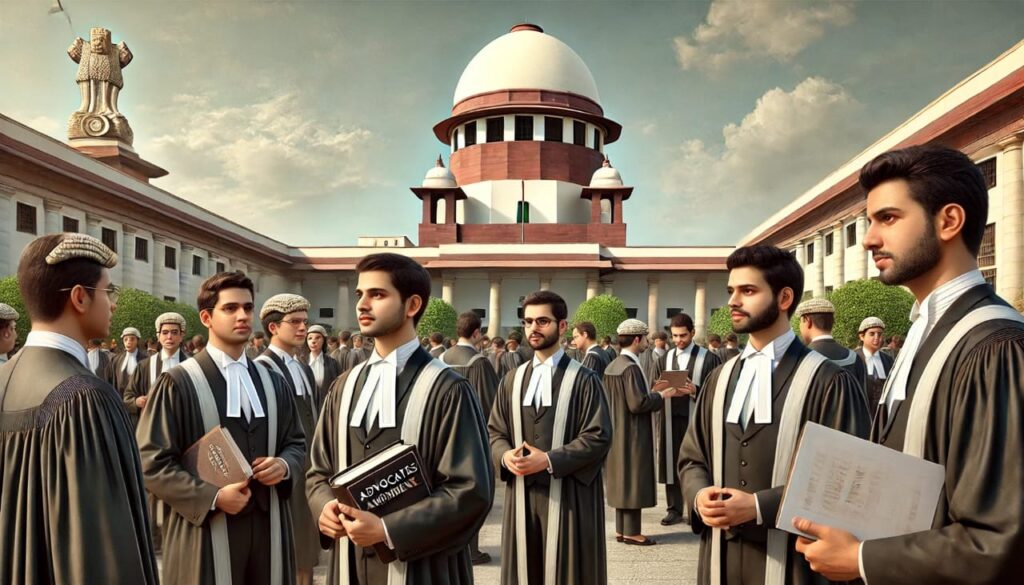Rakia Imran
The Advocates (Amendment) Bill, 2025, brings major updates to the Advocates Act, of 1961, particularly by expanding the definition of “legal practitioner” to include legal professionals apart from practicing advocates. Furthermore, it broadens the scope of “law graduate” and incorporates new provisions for certifying and verifying legal experience. These amendments aim to implement transparency, strengthen regulatory oversight, and modernize legal practice in India. The definition of “legal practitioner” has been precisely described as, “Legal Practitioner” means any Advocate or law graduate engaged in the practice of law before courts, tribunals or quasi-judicial forums or doing legal work in any private or public organization including but not limited to statutory and autonomous bodies, domestic and foreign law firms and corporate entities.”
The Advocates Act is set to undergo significant reforms through the proposed amendments. One of the major changes is the streamlining of legal designations, with the new definition of “advocate” omitting historical terms like vakil, pleader, mukhtar, and revenue agent. This likely signals the phasing out of these roles in favor of a unified professional title. Another crucial modification is the inclusion of law graduates who, despite their legal education, were previously not recognized unless enrolled as advocates. The definition of “practice of law” has also been expanded beyond court appearances to include legal work performed in a range of professional settings. These amendments provide long-awaited legal recognition to corporate lawyers and in-house counsel, acknowledging their contributions to the legal field and addressing the growing demand for their formal inclusion in legal practice regulations.
The decision received widespread support from GC on LinkedIn, with many calling it a progressive step for the legal profession. Tejal Patil, GC at Wipro, said, “It is the beginning of “Re-thinking, Re-defining and Re-evolving the Legal profession in India”. Deeply appreciate the vision of the Hon’ble Law Minister and the move to recognise in-house lawyers as legal practitioners.”
Dr Sanjeev Gemawat, Managing Director & Group General Counsel, Essar Group, said, “Grateful to the Hon’ble Law Minister Shri Arjun Ram Meghwal for spearheading legal reforms through the Advocates (Amendment) Bill, 2025 and for considering the recommendations of GCAI in shaping these crucial amendments to the Advocates Act. These reforms mark a significant step toward strengthening the legal framework, ensuring greater transparency, and enhancing the profession’s integrity. Looking forward to their positive impact on the legal ecosystem.”
The Advocates (Amendment) Bill, 2025, introduces significant reforms, including a new provision under Section 2(i) concerning experience certificates for legal practitioners. The amendment specifies that experience certificates issued by state bar councils, bar associations, courts, tribunals, quasi-judicial forums, and both private and public organizations—such as law firms and corporate entities—will be formally recognized as evidence of legal practice.
Another key change is the revision of the definition of “Law Graduate” under Section 2(h) of the Advocates Act, 1961. The current definition includes only those with a Bachelor’s degree in law from a recognized university. The new amendment expands this to cover individuals who have obtained a three-year or five-year law degree, or any other duration as prescribed, from a Center of Legal Education or a university approved by the Bar Council of India.
On February 13, the Union Law Ministry issued the Advocates (Amendment) Bill, 2025, for public consultation, inviting feedback on these proposed reforms. The Government has urged stakeholders and the public to send their responses via email to dhruvakumar.1973@gov.in and impcell-dla@nic.in no later than February 28, 2025.

